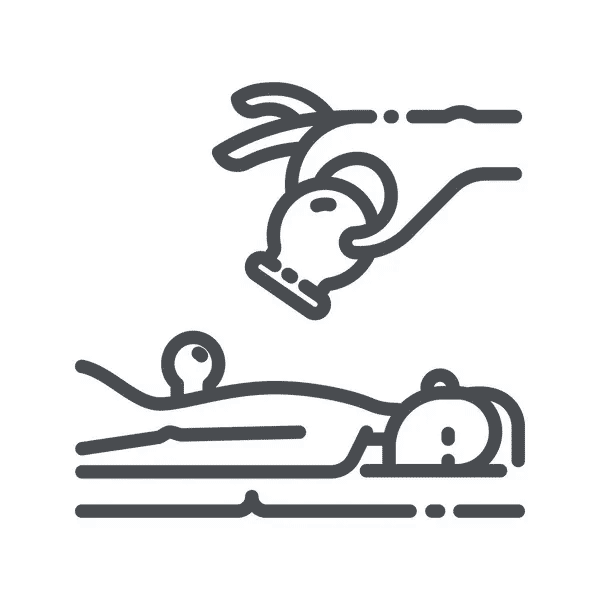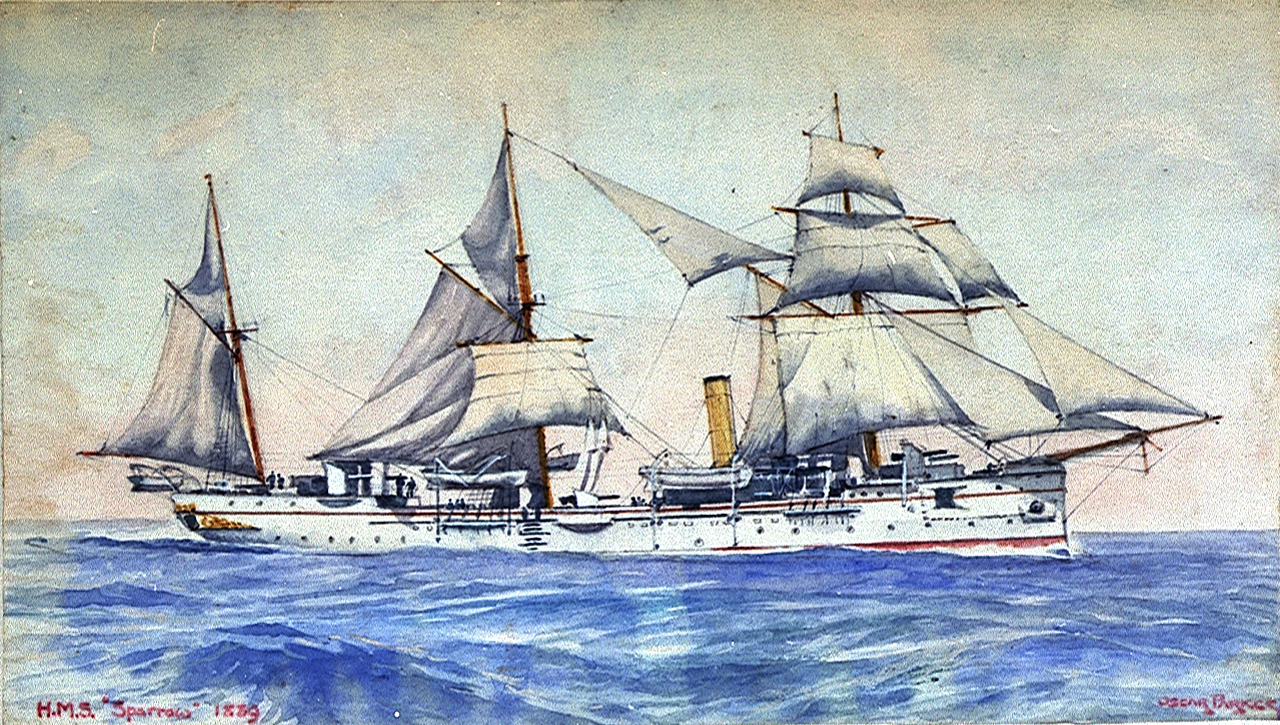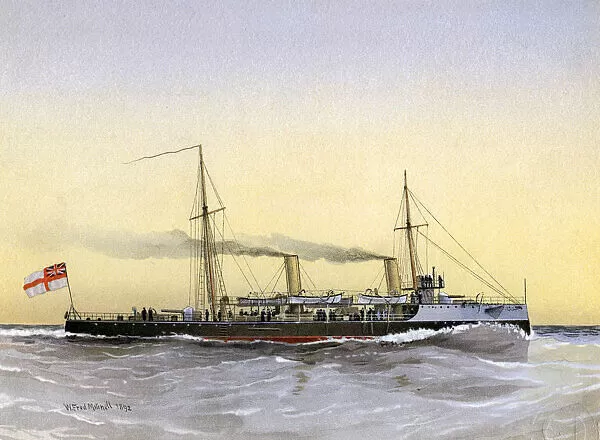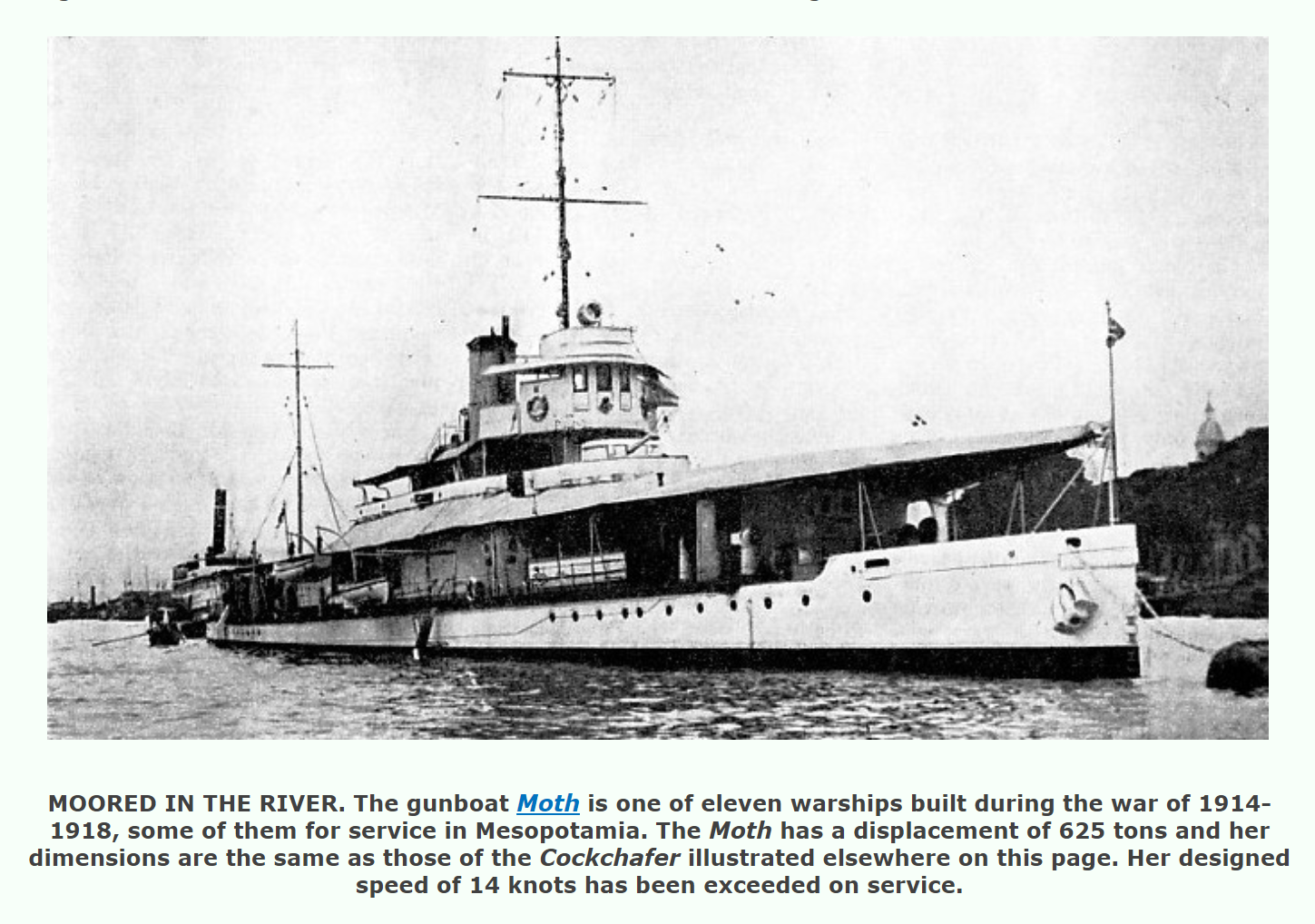2. Chinese Revenue Cruisers
During the night watches of that service in the Navy I turned
over in my mind the question of the future.
One does not
think tidily on such a subject — one merely turns it over and
sets one's subconscious mind to work. I found myself in
China — in effect — and in China I would stay. So I applied to
Sir Robert Hart for a position on his Indoor Staff. He replied
offering me one in his Revenue cruisers; and the day that I
finished my service in the Navy, I joined as Third Officer one
of those smart white gunboats I had seen a year before at
Plymouth. Let me here digress to refer to the likelihood that
there was a bias prompting me to stay in China.
My father was visiting a farmer, and I, some twelve years
old, was with him. There were peacocks in the barken — as
they call the yard in Somerset — and one of these flew up,
settled on my shoulders from behind, and pecked my head and
made it bleed. I was very much alarmed — possibly wept — but
what I remember clearly are my father's words. ` Never mind,
my boy; take it as an omen that some day the Emperor of
China will decorate you with the Peacock's Feather.' This
playful prophecy had no conscious influence on me; I forgot
it until years after I was reminded of it by my mother. But in
view of the fact that I later got that very rare distinction for
a foreigner, it seems rather more than likely that my subconscious self 1 was urging me to make possible the fulfilment
of the prophecy.
1 — This — and other references of the kind — is due to the fact that early
in life and before I had heard the word subconsciousness I realized that I
was subject to a guiding influence independent of my knowledge. I discarded the idea of an occult cause for it, and jumped to the right conclusion — that the knowledge one is conscious of is but a tiny fraction of what lies
hidden in one's brain.
I served in the Revenue cruisers from'89 to'94. They
were officered by foreigners — mostly British — a captain, three
deck officers, three engineers and a gunner.
We flew a
pennant, had a quasi-status of a man-of-war, and took it very
seriously. We were jealous of our dignity. We piped and
bugled, and in the morning crossed top-gallant yards and sent
them down at night; and on Fridays went to general quarters.
We wore swords on occasion; and the captain flew a pennant
in his gig when he called on foreign captains. This status
had its origin in the days before my time when there were but
a few British, French and American gunboats on the coast,
and all the captains were acquainted.
We had seven sea-going vessels in the Customs fleet. Some
were engaged in tending light stations on the three thousand
miles and more of coast; there were the ever-changing channels
in the approaches to Shanghai to be surveyed; there were
official passengers to be transported; rarely there was a venture
after pirates; and there was opium smuggling to be prevented
— if we could — between Hongkong and the mainland and between Singapore and China.
In those days the boundary between China and Hongkong
ran across the narrow Kowloon peninsula, and the object of
the smugglers was to get the opium across it. They would
cone in a band of a hundred or two, armed with Winchester
repeaters; not so much to take the stuff by force across the
frontier as to guard it when they got it from rival bands.
There were fights in the night between these bands and the
Customs guards, with lots of firing, and a field-gun might take
part; but it was mostly noise, though sometimes a man or
two was killed or wounded. In that shore work I took no
share. The part of the cruisers was to patrol the surrounding
waters — mostly at night in steam cutters. My memory of that
duty is not of adventures — I was only under fire once — but of
those narrow bays overshadowed by high hills and sooty dark,
where I lay in wait like a spider for its fly; the lights of Hong-
kong in the distance and the clear starry sky.
For two seasons we cruised in the open sea south of Hainan
Island to intercept the junks from Singapore that might be
smuggling opium. These were the remnant of those deep-sea
junks that in olden days sailed as far as Aden and the Red Sea,
long before the Europeans knew how to build much more than
rowing craft. It was from those junks that the Mediterranean
builders learnt of lee and centre-boards, of keels, of multimasts and of sailing on a wind they were the prototype of
all our modern shipping.1
1 — That is the impression I gained from what I read from time to time
about the history of China's ancient sea-borne trade, but I cannot quote
authorities. The subject seems to be historically obscure. I cull the
following notes from V. C. Holmes's Ancient Ships
There were big craft on the Nile in 5000-6000 B.C., supposedly of
Libyan origin. The first deep-sea craft on record — one trading in the
Red Sea — dates back to 2800 B.C. A famous voyage to the land of Punt
(perhaps Somaliland), to get precious things for Pharaoh, took place in
1600 B.C. An illustration of a large vessel of that period shows that tiers
of oars were used, but there was a large square sail with a yard and with
another spar to which the foot was laced, and this spar was as long as the
boat itself — 100 feet or more. Rameses III. built a fleet at Suez. After
the Egyptians came the Phoenicians as naval architects and navigators.
They made voyages to Cornwall and possibly to Ireland. Somewhere
between 610 and 594 B.C., and acting under orders from Pharaoh Nakau,
they are reputed to have circumnavigated Africa, taking two years for
the job.
There is almost a complete absence of information about early vessels
that relied chiefly on sail power, as apparently the merchant vessel must have
done. I know of no illustration that shows more than one mast with an
inefficient square sail. On the whole, it seems probable that China and
Egypt developed navigation and naval architecture independently, and that
the Chinese were the more advanced. According to Mr. Selfridge, in his
Romance of Commerce, traders from the Indian Ocean arrived in China in
68o B.C. Regarding this, Mr. Selfridge informs me that although he is
certain the information is definitely authentic, he cannot now trace its source.
But in our times Singapore was the limit of their ventures.
They made their homeward passage in the south-west monsoon, which was usually a strong breeze or half a gale, and with
the current always running south against the wind there was
a short and nasty sea; and in that sea we lowered our gig and
boarded, with the junk hove-to and rolling out her soul. One
would think the side to board would be the lee side; but it is
not, the weather side is better owing to the drifting of the junk.
Those were very happy days — ideal from a boyish point of
view — the more so that they did not lack occasionally in real
danger. There was more than a spice of risk when in a
thirty-foot steam cutter one was caught in a sudden gale in the
open sea. Typhoons were regular experiences vastly awe-
inspiring in their monstrous rage and fury. They usually
gave ample notice of their coming, so that our little gunboats
had time to get to some degree of shelter; but shelter, even
in a land-locked harbour, does not always spell immunity,
for, though the weight of the ship's cable in its catenary curve
forms a spring which mitigates the effect of wind and sea,
in a typhoon the vicious force is such that the cables periodically whip out like a solid bar and cause a very dangerous
strain.
There were various sporting elements in that life. Boarding
junks in half a gale has already been referred to. There was
landing at lighthouse stations in a sea-way that gave the boat
a rise and fall of fifteen feet and more against a wall of rock.
One approached how on and jumped out on the rise; and then
the boats quelched down in the foaming backwash, and that
backwash sucked the boat clear from the jagged rocks which
the receding wave exposed. Then there was landing in a
heavy surf, and, what was far more difficult, the getting out
again. We became really skilful at that sort of thing and in
handling boats in general.
But looking back, my memory of that time is not of dangers
or adventures. Partly it is of a happy, care-free, varied time;
partly of my companions, three of whom — Williams, Eldridge
and Myhre — are among my dearest friends to-day; but
mostly it is of ridiculous events. It may be that the more
serious adventures of my later life throw up in relief the humour
of those early days. I could fill a small volume with stories
of that time, but here I must confine myself to telling how
young Payne-Gallway cupped the Captain.
He, the Third Officer, was a most delightful person — so
good-looking, such a charming smile, such perfect manners and
so scrupulous — yet in efficiency, as an officer, he lacked something. He tended to hesitate. I had told him that when
in doubt it was rarely the right thing to mark time, to do
nothing; it was usually better to do something definite, and,
if it proved the wrong thing, to correct it — if he could.
Now our Captain got ill. We were stationed in the neighbourhood of Hongkong, so I wrote to Dr. Cantlie — who later
was Sir James of Harley Street — describing Captain Ross's
symptoms, and sent Gallway in the pinnace with the letter.
In due course the boat returned, and Gallway came on board,
saluted, then turned to me with eagerness: ` I say, do you
know how to dry-cup?' Not quite, though I knew the
principle of the thing — a pinch of cotton-wool with a few drops
of spirit ignited in a tumbler, then slapped upon the skin; the
forming of a vacuum, and the flesh sucked up inside the
tumbler. But knowing the cause of Gallway's eagerness I
said I did not know. ` Well, I do,' he said, ` Cantlie showed
me. We have got to cup the Captain's back, and I have all
the paraphernalia here,' and he indicated the large parcel he
had brought on board.
 We went to the saloon and unpacked the parcel — a quart of
spirits-of-wine, a fulI-sized roll of cotton-wool and a special
thick-rimmed tumbler. Then Gallway got very busy and
important, went to Ross's cabin and turned him on his tummy
and bared his back; he took the tumbler and put a good wad
of wool in it, looked at it thoughtfully, put in as much again
and pressed it down. I now watched to see how far he would
go before he asked for help. He poured in some spirit, looked
for it in the glass but could not find it, so he poured in more —
a wine-glassful or so. In the meantime, as.I did not want the
ship on fire, I had placed a wash-hand basin on the table.
We went to the saloon and unpacked the parcel — a quart of
spirits-of-wine, a fulI-sized roll of cotton-wool and a special
thick-rimmed tumbler. Then Gallway got very busy and
important, went to Ross's cabin and turned him on his tummy
and bared his back; he took the tumbler and put a good wad
of wool in it, looked at it thoughtfully, put in as much again
and pressed it down. I now watched to see how far he would
go before he asked for help. He poured in some spirit, looked
for it in the glass but could not find it, so he poured in more —
a wine-glassful or so. In the meantime, as.I did not want the
ship on fire, I had placed a wash-hand basin on the table.
Gallway put the tumbler in it and lit a match, and I noticed
that his lip was twitching, the sign with him of nervousness
and doubt; but he pulled himself together and lit the thing,
and a flame shot up and reached the deck above. Gallway
did not look at me; some seconds passed, and in the meantime
the paint on the panelling was blistering and the glass became
white-hot. Then he went into the bathroom and came back
with a towel, and I thought that he was going to douse the
flame and give the matter up; but I was only partly right.
He doused the flame, took the white-hot tumbler in the towel
and, before I could prevent him, had not only placed it on poor
Ross's back, but pressed and twisted it and bored a ring
right through the skin; and Ross, who believed that cupping
was a painful process, bore it like a Briton. With his mouth
full of feathers, which he had bitten from his pillow, he lay
there spluttering and groaning.
GalIway followed me to the saloon, and it was he who did
the talking. ` I know that that was wrong. I'll do it right
next time; please, please, don't take the job away from me';
and so I let him. This time the wool and spirits were but a
fraction of what he had used at first, but still were far too much;
and, when again he fetched the towel, I did not dream he would
repeat that awful operation; but he did so; he bored a second
ring in Ross's back.
Later he explained that in each case when he applied the
incandescent tumbler he was carrying out my maxim to do
something when in doubt. He was delighted when the doctor
came next day and said that nothing could have been better
for the Captain than that treatment; it was the equivalent
of the cautery counter-irritant only given up by the profession
on account of its great painfulness.
#




 We went to the saloon and unpacked the parcel — a quart of
spirits-of-wine, a fulI-sized roll of cotton-wool and a special
thick-rimmed tumbler. Then Gallway got very busy and
important, went to Ross's cabin and turned him on his tummy
and bared his back; he took the tumbler and put a good wad
of wool in it, looked at it thoughtfully, put in as much again
and pressed it down. I now watched to see how far he would
go before he asked for help. He poured in some spirit, looked
for it in the glass but could not find it, so he poured in more —
a wine-glassful or so. In the meantime, as.I did not want the
ship on fire, I had placed a wash-hand basin on the table.
We went to the saloon and unpacked the parcel — a quart of
spirits-of-wine, a fulI-sized roll of cotton-wool and a special
thick-rimmed tumbler. Then Gallway got very busy and
important, went to Ross's cabin and turned him on his tummy
and bared his back; he took the tumbler and put a good wad
of wool in it, looked at it thoughtfully, put in as much again
and pressed it down. I now watched to see how far he would
go before he asked for help. He poured in some spirit, looked
for it in the glass but could not find it, so he poured in more —
a wine-glassful or so. In the meantime, as.I did not want the
ship on fire, I had placed a wash-hand basin on the table. 